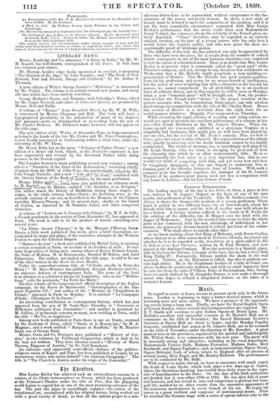ttOr 64tatres.
Miss Louise Keeley has achieved such an extraordinary success in a version of La Chatte metamorphosee en _Femme, which has been produced at the Princess's Theatre under the title of Puss, that the playgoing world begins to regard her as one of the most promising actresses of the day. The part she plays is exceedingly complex—the notion of the transformed cat, encumbered with her original nature, being worked out with a great variety of detail, so that all the actions proper to a mis- chievous kitten have to be represented, without compromise to the fas- cinations of the young and pretty woman. In short, a new style of beauty must be devised to meet the exigencies of the position, and it is not the least remarkable circumstance connected with Miss Louise Keeley's performance that she never could have seen Mademoiselle Jenny Vertpre, the actress on whom the celebrity of the French piece en- tirely depended. " Puss," therefore, may be regarded as an entirely original creation, on the part of a young actress who has only been a month before the London public, and who now gives the most un- questionable proof of histrionic genius. The difficulty of the task she has achieved can only be appreciated by those who have seen the piece, for it results from the number of refined details consequent on one of the most fantastic situations ever contrived to test the talent of a theatrical artist. There is no doubt that Miss Louise Keeley is at present what is commonly called the "great card" of the Princess's company, and yet, strange to say, her piece was withdrawn on Wednesday that a Mr. Melville might perpetrate a very middling re- presentation of Hamlet. This Mr. Melville has good natural qualifica- tions for his profession, and seems by no means devoid of intelligence, but the policy of over-weighting him with a character so far beyond his powers, we cannot comprehend. In all probabili he is an excellent actor of ordinary drama, and in that capacity he will be seen on Monday, when a new "romantic piece" will be brought out. Now, the produc- tion of what the French style " are= " is the proper vocation of the present manager, who, by resuscitating Shakespeare, can only awaken disadvantageous comparisons with the rule of Mr. Charles Kean. Hence this revival of Hamlet is a deviation from the right tract for no useful purpose whatever. Happily, Puss reappeared on Thursday.
While recording the rapid advance of a young and rising actress, we would not omit to mention the excellent performance of a veteran in her art,—Mrs. Frank Matthews at the St. James's Theatre. When the house opened she was merely exhibited as a grotesque Virginia in a singularly bad burlesque, that might just as well have been played by any one else, but the revival of Mr. Poole's comedy, They are both to blame, gives her a part worthy of herself. Her representation of the elderly wife, quietly tyrannizing over the docile husband, cannot be too highly commended. The victim of tyranny, too, is exceedingly well played by Mr. Leigh Murray, who, we trust, is emerging for good and all from the obscurity into which he so often unaccountably falls. He is so unquestionably the best actor in a very important line, that no one would ever think of competing with him, and yet every now and then he ceapietely disappears, so that one forgets to enumerate him as forming part of the effective histrionic force of London. With such a company as he has brought together, the manager of the St. James's Theatre, if he produces good pieces, need not fear a comparison with any house in London,—but let him beware of trash.


























 Previous page
Previous page